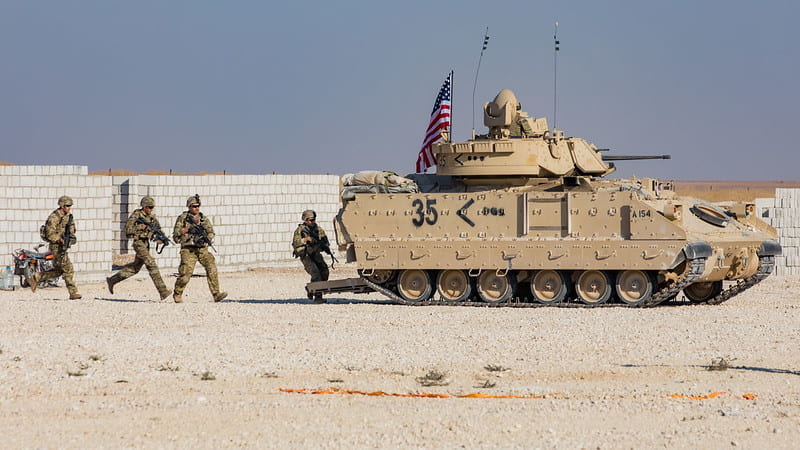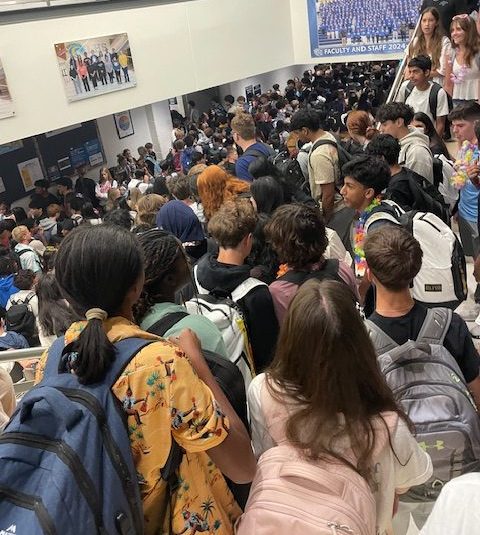OPINION: America’s Misguided Interventionist Foreign Policy
U.S. Soldiers in the 4th Battalion, 118th Infantry Regiment, 30th Armored Brigade Combat Team, North Carolina Army National Guard, attached to the 218th Maneuver Enhancement Brigade, South Carolina Army National Guard, on maneuvers in eastern Syria.
May 12, 2021
On the morning of September 11, 2001, the public saw the terror and atrocities Al-Qaeda unleashed on innocent civilians. What no one really talks about is how the United States of America does this to a myriad of countries on virtually a daily basis. In school, students are taught the positive presence the U.S. had on international conflicts like the resolution with the Suez Canal and involvement in both World Wars. What isn’t touched on enough is the destruction the world power induces on unsuspecting countries because American have a tendency to become involved in international affairs to assert dominance- an act which often does not benefit either party.
For example, following the attacks on 9/11, the U.S. entered Iraq to, according to statements released by then US President George Bush and British Prime Minister Tony Blair, “disarm Iraq of weapons of mass destruction (WMD), to end Saddam Hussein’s support for terrorism, and to free the Iraqi people.” Some time after the invasion, according to Ari Fleischer, White House Press Secretary from the Bush Administration, “no WMDs were found in Iraq.” Saddam Hussein, the dictator of Iraq who oppressed the people, was publicly executed in 2006, three years after U.S. intervention, prompting the question why America continued to have a military presence after the three goals they had hoped to achieve were successful and why the Iraq War continued until 2011. By then, approximately 5,000 U.S. military lives had been lost. After the Iraq War, the US still had a presence in Iraq, only it shifted from a proactive, large-scale counterinsurgency operation to a training/advising role. Essentially, the US entered Iraq as a declaration of war and yet the reasons they were originally there were essentially ‘cleared’ by 2006. However, US presence remained for another five years- resulting in thousands of casualties. Iraq was not in the best shape when the US became involved but perhaps Iraq could be in better shape currently had the US not continued military presence after the war. The situation in Iraq is not an isolated incident- America has a history of having this impact on other middle eastern countries like Syria.
In March 2011, after the Syria government tortured teenagers for sharing democratic views, protests took place all over Syria, inciting the start of the Syrian Civil War. The Syrian President stepped down from his position and the assets of the Syrian government were frozen per President Obama’s request. Essentially, an outsider-in this case the United States- made the leader of a foreign country step down and even froze the government’s money. The latter move only made the situation in Syria more dire.
In May 2020, there were a series of nationwide protests in the United States that took place after the murder of George Floyd at the hands of a Minneapolis police officer. Did another country step in and force President Trump out of power? Did a political leader of another nation freeze the U.S. government’s assets? No. As such, the civil protests that took place in the country should have continued in the country. When the American Civil War had happened no other countries had stepped in so why was it that when it happened in a middle eastern country, America had to step in?
If there was a larger problem at hand in Syria in 2011, the United Nations, the international community, or any other organization looking to benefit the people of Syria could have taken action. Instead, the United States of America, a foreigner to the domestic situation at hand, stepped in, escalating it into an international matter. An international governmental organization should have stepped in instead of a biased, world power.
A decade later, around 900 US troops remain [in Syria] and as reported by David Cloud in the LA Times in 2021, “the Biden Administration does not appear to be in any rush to pull [them] out.” If the United States actually helped Syria then the story would be different but according to the United Nations, as of January of 2019,400,000 people have been killed in Syria, 5.6 million have fled the country, and over six million have been internally displaced. Similar to what happened with Iraq, the efforts of the US were inefficient and resulted in more deaths. Therefore, in both the cases of Iraq and Syria, the US only added to the situation instead of alleviating it.
Political leaders in the U.S. seem to always promote the idea of peace and yet enact foreign policy that is instrumental to providing the opposite. President Bush and President Obama led America’s intervention in Iraq and Syria. Presidents afterward have kept troops there despite claims stating otherwise. Donald Trump, for example, repeatedly stated that U.S. troops should have never been in Iraq and Syria and yet never enacted policy to remedy the situation. Syria and Iraq aren’t the only examples of America’s dominance and chokehold on developing countries and it most likely won’t be the last.





